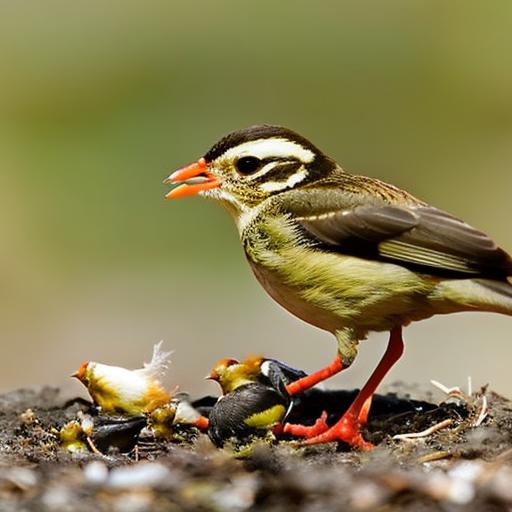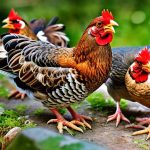Raising healthy chickens starts from the very beginning, and one crucial aspect of this is providing them with the right nutrition. Starter feed for chicks plays a vital role in their growth and development, setting the foundation for their future health and productivity. In this article, we will explore the importance of starter feed, the nutrients it contains, and how to ensure that your chicks receive optimal nutrition during this critical phase.
Key Takeaways
- Starter feed is designed to provide young chicks with the necessary nutrients for growth and development.
- Proper nutrition is crucial for young chickens to ensure they grow into healthy, productive hens.
- Transitioning from starter feed to grower feed should occur around 6-8 weeks of age.
- Factors such as breed, growth rate, and environment should be considered when deciding how long to feed starter feed.
- Chicks are ready to switch to grower feed when they have fully developed feathers and are able to regulate their body temperature.
Understanding the Purpose of Starter Feed for Chicks
Starter feed is specifically formulated to meet the nutritional needs of young chicks during their first few weeks of life. It provides them with the essential nutrients they need to grow and develop properly. The primary purpose of starter feed is to support the rapid growth of chicks and help them establish a healthy digestive system.
Starter feed typically contains a balanced combination of proteins, carbohydrates, fats, vitamins, and minerals. Proteins are crucial for muscle development, while carbohydrates provide energy. Fats are essential for proper brain development, and vitamins and minerals support overall health and immunity. The specific composition may vary slightly between different brands, but all starter feeds aim to provide a complete and balanced diet for young chicks.
The Importance of Providing Proper Nutrition for Young Chickens
Proper nutrition is vital for young chickens as it directly impacts their growth, health, and future productivity. Chicks that receive inadequate nutrition may experience stunted growth, weakened immune systems, and increased susceptibility to diseases. They may also develop skeletal abnormalities or have difficulty laying eggs later in life.
Feeding chicks a well-balanced diet from the start sets them up for a healthy life. It ensures that they receive all the necessary nutrients to support their rapid growth and development. Providing proper nutrition also helps chicks develop strong bones, muscles, and feathers, which are essential for their overall well-being.
When to Transition from Starter Feed to Grower Feed
| Age of Poultry | Starter Feed Duration | Grower Feed Duration | Weight of Poultry |
|---|---|---|---|
| 0-2 weeks | 14-21 days | N/A | Less than 1 lb |
| 2-4 weeks | 14-21 days | 4-6 weeks | 1-3 lbs |
| 4-8 weeks | N/A | 4-6 weeks | 3-5 lbs |
| 8-16 weeks | N/A | 8-16 weeks | 5-8 lbs |
Knowing when to transition from starter feed to grower feed is crucial for the continued growth and development of your chicks. Typically, chicks can be transitioned to grower feed around 8 to 10 weeks of age. However, this timeline may vary depending on the breed and individual growth rate of your chicks.
Factors to consider when making this decision include the size and weight of the chicks, their overall health and development, and their activity levels. If your chicks are growing well, have developed feathers, and are actively foraging, it may be a good indication that they are ready for a change in diet.
Factors to Consider When Deciding How Long to Feed Starter Feed
Several factors can influence how long you should feed starter feed to your chicks. These factors include the breed of the chicks, their growth rate, their overall health, and the quality of their diet. It is important to consider these factors when making feeding decisions to ensure that your chicks receive optimal nutrition.
Different breeds have different growth rates, so some may require starter feed for a longer period than others. Additionally, if you notice that your chicks are not growing as quickly as expected or are showing signs of malnutrition, it may be necessary to continue feeding them starter feed for a longer duration.
How to Determine if Chicks are Ready to Switch to Grower Feed

There are several signs that indicate that chicks are ready to transition from starter feed to grower feed. One of the most obvious signs is when they have developed a full set of feathers. Feathers provide insulation and protection, allowing chicks to regulate their body temperature more effectively.
Another sign is when chicks start actively foraging and showing interest in other food sources. This indicates that they are ready for a more varied diet and can handle the transition to grower feed. Additionally, if your chicks have reached the recommended age for transitioning and are growing well without any signs of malnutrition or stunted growth, it is likely safe to switch to grower feed.
The Risks of Over- or Under-Feeding Starter Feed to Chicks
Over- or under-feeding starter feed to chicks can have detrimental effects on their health and development. Overfeeding can lead to obesity, which can cause skeletal problems and strain on the heart and other organs. It can also lead to decreased activity levels and reduced fertility in hens.
On the other hand, underfeeding can result in malnutrition, stunted growth, weakened immune systems, and increased susceptibility to diseases. It can also lead to poor feather development and delayed sexual maturity in hens. It is crucial to monitor your chicks’ diets carefully and provide them with the appropriate amount of starter feed to avoid these risks.
Common Mistakes to Avoid When Feeding Starter Feed to Chicks
When feeding starter feed to chicks, there are some common mistakes that people often make. One of these is providing too much or too little feed. It is important to follow the recommended feeding guidelines provided by the manufacturer and adjust the amount as needed based on your chicks’ growth and development.
Another common mistake is not providing enough fresh water. Chicks need access to clean water at all times, as it is essential for digestion and overall health. Make sure to regularly check their water supply and clean their waterers to prevent contamination.
Tips for Ensuring Chicks Receive Optimal Nutrition During the Starter Feed Phase
To ensure that your chicks receive optimal nutrition during the starter feed phase, there are several tips you can follow. First, make sure to provide them with a high-quality starter feed that meets their nutritional needs. Look for feeds that contain a balanced combination of proteins, carbohydrates, fats, vitamins, and minerals.
Monitor your chicks’ growth and development closely and make adjustments to their diet as needed. If you notice any signs of malnutrition or stunted growth, consult with a poultry nutritionist or veterinarian for guidance. Additionally, provide your chicks with access to fresh water at all times and ensure that their feeders are clean and free from contaminants.
Comparing Different Brands of Starter Feed for Chickens
There are several different brands of starter feed available for chickens, and it can be overwhelming to choose the best one for your chicks. When comparing different brands, consider factors such as the ingredients used, the nutrient composition, and any additional additives or supplements included.
Look for starter feeds that use high-quality ingredients and have a balanced nutrient profile. Avoid feeds that contain excessive fillers or artificial additives. It can also be helpful to read reviews from other chicken owners or seek recommendations from experienced poultry farmers.
The Role of Starter Feed in Raising Healthy, Productive Hens
Starter feed plays a crucial role in raising healthy, productive hens. By providing proper nutrition during the starter feed phase, you are setting the foundation for their future health and productivity. Chicks that receive optimal nutrition during this critical phase are more likely to grow into strong, healthy hens that lay eggs consistently and have a longer lifespan.
Proper nutrition during the starter feed phase also helps prevent common health issues such as skeletal abnormalities, weak immune systems, and poor feather development. It ensures that hens have the necessary nutrients to support egg production and overall well-being throughout their lives.
In conclusion, starter feed for chicks is a vital component of raising healthy chickens. It provides them with the essential nutrients they need to grow and develop properly, setting the foundation for their future health and productivity. By understanding the purpose of starter feed, providing proper nutrition, and making informed feeding decisions, you can ensure that your chicks receive optimal nutrition during this critical phase. Prioritizing proper nutrition from the start will contribute to the long-term health and productivity of your flock.
If you’re wondering how long to keep chickens on starter feed, you may also be interested in learning about what kind of coop is best for chickens. Having a suitable and well-designed chicken coop is essential for the health and safety of your flock. This article from Poultry Wizard provides valuable insights into the different types of chicken coops available and helps you determine which one would be most suitable for your chickens. Check it out here.
FAQs
What is starter feed for chickens?
Starter feed is a type of feed that is specifically formulated for young chicks. It contains higher levels of protein and other nutrients that are essential for their growth and development.
How long should chickens be fed starter feed?
Chickens should be fed starter feed for the first 6-8 weeks of their life. After that, they can be transitioned to a grower feed which has lower levels of protein.
What happens if chickens are fed starter feed for too long?
If chickens are fed starter feed for too long, they may become overweight and develop health problems. Starter feed is designed to meet the nutritional needs of young chicks, and feeding it to older birds can lead to an imbalance of nutrients.
Can chickens be fed a combination of starter and grower feed?
Yes, chickens can be fed a combination of starter and grower feed during the transition period. This can help them adjust to the lower protein levels in the grower feed.
What should be the protein content of starter feed for chickens?
The protein content of starter feed for chickens should be around 20-22%. This is higher than the protein content of grower and layer feeds, which typically have around 16-18% protein.
Meet Walter, the feathered-friend fanatic of Florida! Nestled in the sunshine state, Walter struts through life with his feathered companions, clucking his way to happiness. With a coop that’s fancier than a five-star hotel, he’s the Don Juan of the chicken world. When he’s not teaching his hens to do the cha-cha, you’ll find him in a heated debate with his prized rooster, Sir Clucks-a-Lot. Walter’s poultry passion is no yolk; he’s the sunny-side-up guy you never knew you needed in your flock of friends!







